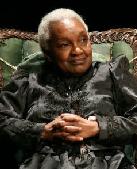SITE GUIDE
< a href="searchcu.html">SEARCH
REVIEWS
FEATURES
NEWS
Etcetera and
Short Term Listings
LISTINGS
Broadway
Off-Broadway
NYC Restaurants
BOOKS and CDs
OTHER PLACES
Berkshires
London
California
DC
Philadelphia
Elsewhere
QUOTES
On TKTS
PLAYWRIGHTS' ALBUMS
LETTERS TO EDITOR
FILM
LINKS
MISCELLANEOUS
Free Updates
Masthead
Writing for Us
A CurtainUp  London Review
London Review
 London Review
London ReviewGem of the Ocean
by Neil Dowden
|
Life is a mystery. It ain't all for you to know.
--- Aunt Ester Tyler |

Carmen Munroe as Aunt Ester Tyler
(Photo: John Haynes) |
Although the penultimate work in the series, Gem is chronologically the first, as it is set in 1904 while, like almost all the others, the action takes place in the slum Hill District of Pittsburgh, Pennsylvania, where Wilson grew up. Slavery may have been abolished about 40 years earlier but it is still a potent memory for some of the characters, and the struggle for black Americans to gain equal rights and escape economic deprivation goes on.
In this harsh world, the home of spiritual guru Aunt Ester Tyler (Carmen Munroe) acts as a "sanctuary"', which she shares with the watchful sentinel Eli (Lucian Msamati) and fiercely independent housekeeper Black Mary (Jenny Jules). The young Citizen Barlow (Kobna Holdbrook-Smith) forces his way into the house, in desperate need of "soul washing." Having fled the oppressive racism of his native Alabama, he is now overcome with guilt as another worker at the local tin mill has killed himself after being falsely accused of stealing a bucket of nails which it turns out Citizen himself stole.
Aunt Ester takes pity on Citizen as he reminds her of her dead son, while Eli regards him with suspicion and Black Mary is warily attracted. They are also visited by the friendly white tinker Rutherford Selig (Nathan Osgood), the ex-slave Solly Two Kings (Joseph Marcell) who ekes out a living by selling dog shit, and Mary's lawman brother Caesar (Patrick Robinson), an Uncle Tom who has done well for himself by putting down 'niggers' who cause trouble for his white masters.
Wilson's humanity and humour shine through the richly lyrical language he uses to create fully rounded characters, and there is a strong sense of individuals' lives being shaped by their largely hostile environment. But there is a distinct lack of dramatic momentum in the first act, with too many long speeches and not much happening (and most of what does is off-stage). However, the necessary tensions and dynamics are all in place for accelerated development in the second act, when the drama really catches fire.
Although the predominating style is naturalistic, there is also a metaphorical quality in Wilson's writing. This comes to the fore when the allegedly 285-year old Aunt Ester puts Citizen into a trance in order for him to travel to the "City of Bones" in a paper boat -- the Gem of the Ocean -- to achieve some form of redemption. Maybe Wilson strains a little too hard here for mythic meaning but the scene is brilliantly staged, complete with chanting and gospel singing, as it re-enacts a slave-ship journey back to the African ancestral home.
This combination of realism and symbolism is also expressed in Libby Watson's set, a beautifully detailed tumbledown parlour with peeling walls and broken windows, where the concave wooden floor resembles the bottom of a ship.
Director Paulette Randall (who was responsible for three of the other Wilson plays at the Tricycle) deserves much credit for eliciting such powerful and persuasive performances from the cast, no doubt helped by the fact that as an ensemble company they have already acted together.
As Aunt Ester, Carmen Munroe exudes an air of authority and wisdom in the still dignity with which she carries herself, while Kobna Holdbrook-Smith makes Citizen's spiritual and political transformation very believable. Joseph Marcell's avuncular Solly is also an inspiringly indomitable figure, with the chain-link he keeps in his breast pocket a reminder of his slavery past, and Patrick Robinson shows how the ruthless Caesar does not let fellow feeling get in the way of his ambition.
Last year's West End production of Death of a Salesman was a splendid (if already planned) tribute to the late Arthur Miller's great contribution to twentieth-century theatre. What we need now is a similarly inspired revival of August Wilson's masterpiece Fences.
To read our Los Angeles and New York reviews of this play go here
|
GEM OF THE OCEAN
Written by August Wilson Directed by Paulette Randall With: Lucian Msamati, Kobna Holdbrook-Smith, Carmen Munroe, Jenny Jules, Nathan Osgood, Joseph Marcell, Patrick Robinson Set Design: Libby Watson Lighting: Ace McCarron Music: Clement Ishmael Costumes: Anna Barcock A Tricycle Theatre production Running time: Two hours and 45 minutes with one interval Box Office: 020 7328 1000 Booking to 11th February 2006 Reviewed by Neil Dowden based on 10th January performance at the Tricycle Theatre, 269 Kilburn High Road, London NW6 (Underground: Kilburn) |





